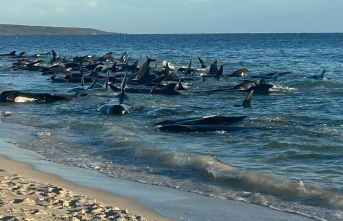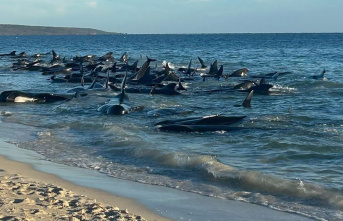Some time ago, a probe brought material from the asteroid Ryugu - from which research teams derive numerous findings: Organic molecules have already formed in the cold cloud of gas and dust from which our solar system once emerged. These substances later reacted with liquid water inside protoplanets to form increasingly complex molecules - which may eventually have helped create life on Earth.
Ryugu is an asteroid about 900 meters in diameter orbiting the sun in a near-Earth orbit. This makes it a good target for space probes. The soil samples were brought to earth by the Japanese probe "Hayabusa-2". The sample container contained just 5.4 grams of rock fragments measuring up to one centimeter. Several research teams recently reported on the results of their analyzes in a special edition of the journal "Science".
Thousands of organic molecules found
The rocks of Ryugu contain thousands of different organic molecules, including amino acids. From the frequency and the exact structure, the scientists reconstructed the history of the small asteroid. Some of the organic matter had already formed in the cold gas cloud in which the solar system formed about 4.5 billion years ago.
Ryugu is a fragment of a larger body that formed in the early days of the solar system and was later destroyed by a collision with another celestial body. According to the current state of knowledge, this original body was initially heated by radioactivity. This allowed liquid water to form and lead to chemical reactions that led to the formation of larger and larger macromolecules. As the analyzes showed, the temperature during these processes was around 40 degrees over several million years. Then Ryugu's original body slowly cooled down and froze - since then the organic molecules have remained almost unchanged.
Did meteorites encourage the emergence of life?
The researchers were particularly amazed that the molecules themselves have survived in the samples from the surface of Ryugu for billions of years. There they were not only exposed to the vacuum of space, but also to cosmic rays and the sun's ultraviolet rays. The scientists see this as evidence for the thesis that meteorites enriched the young earth with prebiotic organic substances and thus promoted the emergence of life.
The "Hayabusa-2" probe launched in December 2014 had explored the small celestial body in 2018 and 2019 with numerous instruments. The probe also landed on Ryugu twice, collecting both surface samples and material from deeper layers, which were uncovered with the help of a small projectile. The probe then made its return flight to Earth, dropping a capsule containing the collected samples on December 6, 2020.











